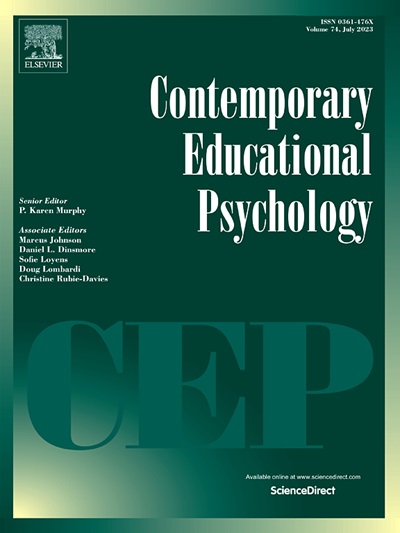从错误中学习:故意的错误能促进学习
IF 3.8
1区 心理学
Q1 PSYCHOLOGY, EDUCATIONAL
引用次数: 0
摘要
故意错误是一种有效的学习策略,与检索练习相当。然而,学习者经常会对这两种策略产生元认知错觉,这使得它们的采用具有挑战性,特别是对于故意错误。本研究通过三个实验比较了故意错误(S - D)与检索练习(S - T)和再学习(S - S)的有效性:实验1侧重于即时测试,实验2侧重于延迟测试。在实验3中,在即时和延迟测试中评估了故意错误(S - D)、反馈检索练习(S - T - S - T)和再学习(S - S - S - S)的影响。结果显示,在即时测试中,无论检索练习是否包含反馈(实验3),故意错误与检索练习之间均无显著差异。然而,故意犯错误总是比重新学习效果好。在延迟测试中,有意错误显著优于检索练习,无论是否有反馈,两种策略都优于重新学习。结果表明,与检索练习相比,故意错误在更长的时间间隔内表现出更好的记忆保留。本研究结果为故意错误、检索练习和再学习策略的应用提供了实证依据。本文章由计算机程序翻译,如有差异,请以英文原文为准。
Learning from errors: deliberate errors enhance learning
Deliberate erring is an effective learning strategy, comparable to retrieval practice, However, learners often experience metacognitive illusions regarding both strategies, making their adoption challenging, particularly for deliberate errors. This study compares the effectiveness of deliberate errors (S – D) with retrieval practice (S – T) and restudy (S – S) across three experiments: Experiment 1 focused on immediate testing, while Experiment 2 examined delayed testing. In Experiment 3, the impact of deliberate errors (S – D), retrieval practice with feedback (S – T – S – T), and restudy (S – S – S – S) was assessed in both immediate and delayed tests. Results showed no significant difference between deliberate errors and retrieval practice in immediate tests, regardless of whether retrieval practice included feedback (Experiment 3) or not (Experiment 1). However, deliberate errors consistently outperformed restudy. In delayed tests, deliberate errors significantly outperformed retrieval practice, whether with or without feedback, and both strategies were superior to restudy. The results indicate that, compared to retrieval practice, deliberate errors show better memory retention over a longer time interval. The findings of this study provide empirical evidence for the application of deliberate error, retrieval practice, and restudy strategies.
求助全文
通过发布文献求助,成功后即可免费获取论文全文。
去求助
来源期刊

Contemporary Educational Psychology
PSYCHOLOGY, EDUCATIONAL-
CiteScore
16.50
自引率
3.90%
发文量
74
期刊介绍:
Contemporary Educational Psychology is a scholarly journal that publishes empirical research from various parts of the world. The research aims to substantially advance, extend, or re-envision the ongoing discourse in educational psychology research and practice. To be considered for publication, manuscripts must be well-grounded in a comprehensive theoretical and empirical framework. This framework should raise critical and timely questions that educational psychology currently faces. Additionally, the questions asked should be closely related to the chosen methodological approach, and the authors should provide actionable implications for education research and practice. The journal seeks to publish manuscripts that offer cutting-edge theoretical and methodological perspectives on critical and timely education questions.
The journal is abstracted and indexed in various databases, including Contents Pages in Education, Australian Educational Index, Current Contents, EBSCOhost, Education Index, ERA, PsycINFO, Sociology of Education Abstracts, PubMed/Medline, BIOSIS Previews, and others.
 求助内容:
求助内容: 应助结果提醒方式:
应助结果提醒方式:


